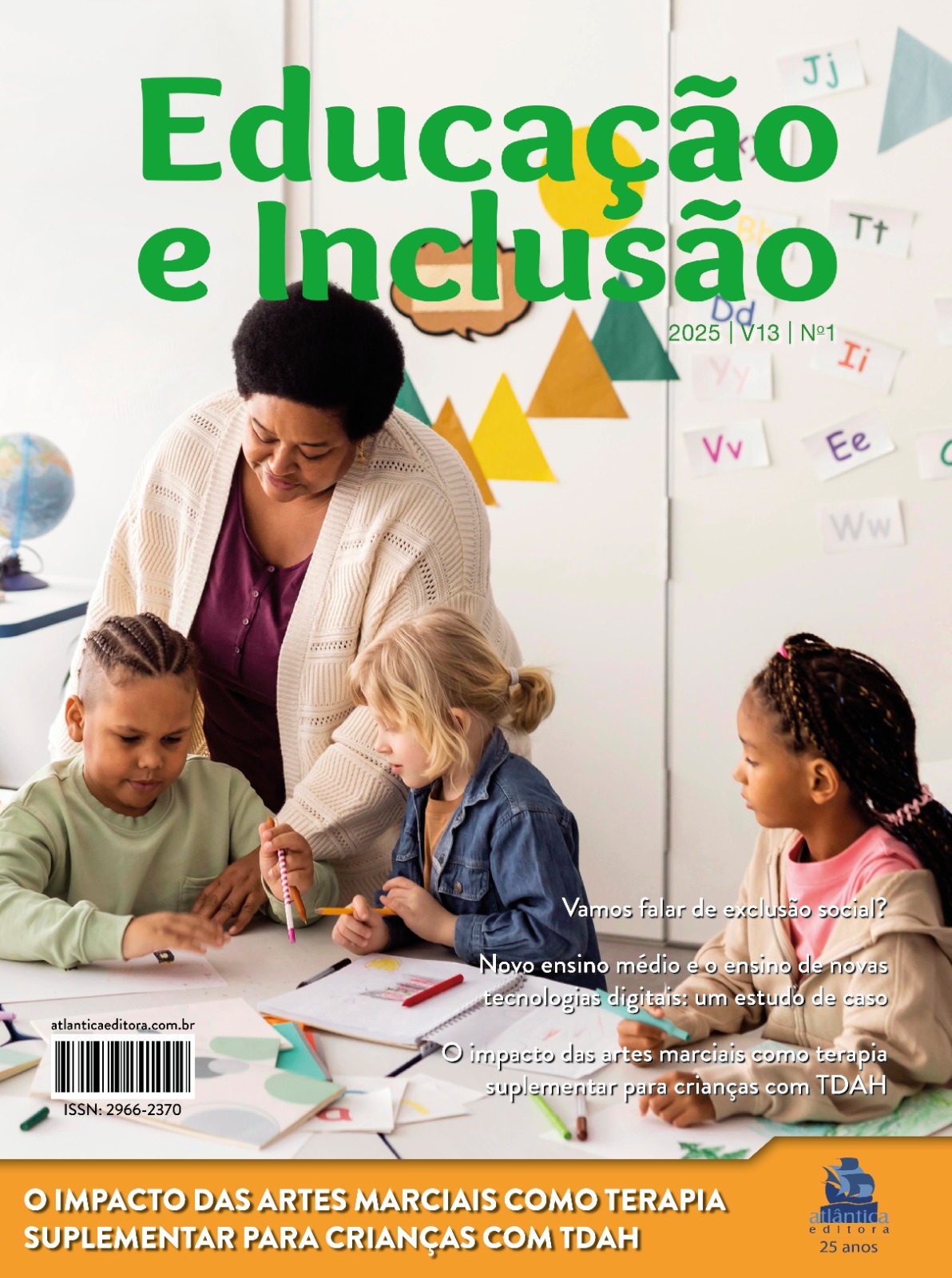Teacher training for anti-racism in the Centers of Studdy on Ethnic-Racial relations
DOI:
https://doi.org/10.62827/ei.v13i1.1004Keywords:
Professional Training; Antiracism; Public Policy.Abstract
Introduction: This article analyzes an experience of implementing a continuing and in-service training policy established by the Centers for the Study of Ethnic-Racial Relations – NERER, created in the Belo Horizonte Municipal Education Network, aiming to promote anti-racist education. NERER carries out training processes for education professionals, with the purpose of implementing laws 10,639/2003 and 11,645/2008 in municipal schools. Objective: To analyze how ethnic-racial issues have been addressed in discussions and guidance carried out in the continuing training of teachers for the construction of anti-racist pedagogical practices. Methods: Analysis of interactional events, that is, everyday situations in which people get involved, identified through the construction of a general timeline of the activities carried out. Results: NERER as a continuing and in-service training policy is guided by principles and guidelines, such as peer-to-peer training, the valorization of practices that emerge from the educational context itself, and training as a right and the school as a space for knowledge production. These precepts have ensured the continuity of the policy and its reach throughout the municipal education network. Conclusion: The results that have been achieved by NERER, in reformulating pedagogical practices, are related to the way they organize and develop training actions, based on periodicity, peer-to-peer training and the selection of themes linked to the demands of teaching contexts.
References
Maldonato-Torres N. Sobre la colonialidad del ser: contribuciones al desarrollo de un concepto. En: Castro-Gómez S, Grosfoguel R, editores. El giro decolonial. Reflexiones para una diversidad epistémica más allá del capitalismo global. [Internet]. Bogotá: Iesco-Pensar-Siglo del Hombre Editores; 2007. p. 127-167. [citado 2025 fev 09]. Disponível em: https://ram-wan.net/restrepo/decolonial/17-maldonado-colonialidad%20del%20ser.pdf doi: 10.2307/j.ctvnp0jr5.23
Brasil. Presidência da República. Lei 10.639 de 9 de janeiro de 2003. Altera a Lei 9.394, de 20 de dezembro de 1996, que estabelece as diretrizes e bases da educação nacional, para incluir no currículo oficial da Rede de Ensino a obrigatoriedade da temática "História e Cultura Afro-Brasileira", e dá outras providências [Internet]. Brasília; 2003 [citado 2025 fev 09]. Disponível em: http://www.planalto.gov.br/ccivil_03/leis/2003/l10.639.htm
Brasil. Presidência da República. Lei nº 11.645, de 10 março de 2008. Altera a Lei nº 9.394, de 20 de dezembro de 1996, modificada pela Lei nº 10.639, de 9 de janeiro de 2003, que estabelece as diretrizes e bases da educação nacional, para incluir no currículo oficial da rede de ensino a obrigatoriedade da temática “História e Cultura Afro-Brasileira e Indígena” [Internet]. Brasília; 2008 [citado 2025 fev 09]. Disponível em: http://www.planalto.gov.br/ccivil_03/_ato2007-2010/2008/lei/l11645.htm
Green J, Bloome D. Ethnography and ethnographers of and in education: a situated perspective. In: Flood J, Lapp D, Heath SB, editores. Handbook of research on teaching literacy through the communicative and visual arts. London: Routledge; 1997. p. 181-202.
XXXXX. Situating learning within collective possibilities: examining the discursive construction of opportunities for learning in the classroom. [tese]. Santa Barbara (CA): University of California, Santa Barbara; 2000. 527 f. [citado 2025 fev 09].
Bloome D, Carter SP, Christian BM, Madrid S, Otto S, Faris NS, et al. On discourse analysis in classrooms. Approaches to language and literacy research. New York, London: Teachers College, Columbia University; 2008. [citado 2025 fev 09].
XXXXX, YYYYYYY, ZZZZZZZ. Eventos interacionais e eventos de letramento: um exame das condições sociais e semióticas da escrita em uma turma de educação infantil. Cadernos Cedes [Internet]. 2013 jan-abr;33(89):91-107. [citado 2025 fev 09]. Disponível em: https://www.scielo.br/j/ccedes/a/vDxyR99wq4McQ4JNrtBrc6k/?lang=pt
Agar M. Language shock. Understanding the culture of conversation. New York: Perennial; 2002. [citado 2025 fev 09].
Brasil. Decreto nº 4.886, de 20 de novembro de 2003b. Institui a Política Nacional de Promoção da Igualdade Racial – PNPIR e dá outras providências. [Internet]. Brasília; 2003 [citado 2025 fev 09]. Disponível em: https://www.planalto.gov.br/ccivil_03/decreto/2003/D4886.htm
Walsh C. Interculturalidade crítica e pedagogia decolonial: in-surgir, re-existir e re-viver. In: Candau VM, editor. Educação intercultural na América Latina: entre concepções, tensões e propostas. Rio de Janeiro: Editora 7 Letras; 2009. p. 12-39. [citado 2025 fev 09].
Gumperz JJ. Discourse strategies: studies in interactional sociolinguistics. Cambridge (UK): Cambridge University Press; 1982. [citado 2025 fev 09].
Adichie CN. O perigo de uma história única. Tradução de Júlia Romeu. São Paulo: Companhia das Letras; 2019. [citado 2025 fev 09].
Green J, Dixon C, Zaharlick A. A etnografia como uma lógica de investigação. Educação em Revista [Internet]. 2005 dez;(42):13-79. Belo Horizonte: Programa de Pós-Graduação da Faculdade de Educação da Universidade Federal de Minas Gerais. [citado 2025 fev 09]. Disponível em: https://periodicos.ufmg.br/index.php/edrevista/article/view/45228
Green J, Wallat C. Mapping instructional conversations – A sociolinguistic ethnography. Ethnography and Language in Educational Settings. 1981;5:161-205. [citado 2025 fev 09].
Gumperz JJ, Berenz N. Transcribing conversational exchanges. In: Edwards JA, Lampert M, editores. Talking data: transcription and coding in discourse research. New Jersey: New Lawrence Erlbaum; 1993. [citado 2025 fev 09].
Downloads
Published
Issue
Section
License
Copyright (c) 2025 Andréa Cristina Ulisses de Jesus, Maria Lúcia Castanheira, Elizabeth Guzzo de Almeida (Autor)

This work is licensed under a Creative Commons Attribution 4.0 International License.
Autores que publicam nesta revista concordam com os seguintes termos:
Autores mantém os direitos autorais e concedem à revista o direito de primeira publicação, com o trabalho simultaneamente licenciado sob a Licença Creative Commons Attribution 4.0 que permite o compartilhamento do trabalho com reconhecimento da autoria e publicação inicial nesta revista.
Autores têm autorização para distribuição não-exclusiva da versão do trabalho publicada nesta revista (ex.: publicar em repositório institucional ou como capítulo de livro), com reconhecimento de autoria e publicação inicial nesta revista.


